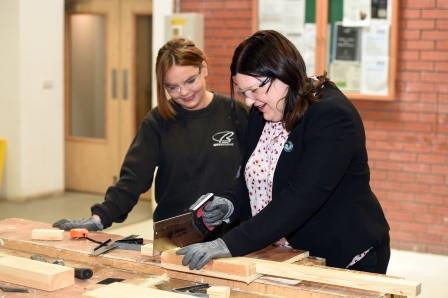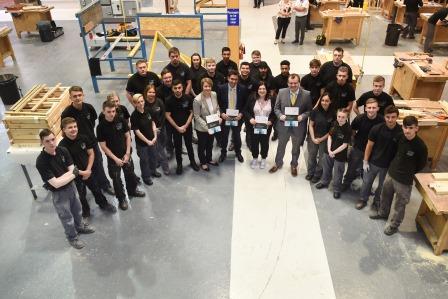A landmark report produced to assist City Building’s diversity drive has found that almost half of its employees come from geographical areas identified as being the three most deprived in Scotland.
According to the study, which the first of its kind for the construction industry in Scotland, 49% of the construction firm’s workforce comes from postcodes contained within the top three areas of the Social Index of Multiple Deprivation (SIMD). Almost a quarter of staff – 24% – are from the most impoverished postcodes which are ranked as SIMD 1 by the index. Reporting every three years, SIMD ranks geographical areas in Scotland based on their relative level of deprivation, using measures such as health, crime and employment. With City Building employees earning an average of £27,805, their salaries are helping to reduce income poverty in these areas. Reflecting the traditional gender disparity in the construction sector, the report found that 10% of City Building’s workforce are women, which is in line with the wider industry figure of 11%.

Second year joiner Kayleigh Finnigan and Cllr Susan Aitken
However, the analysis also found that the Glasgow construction firm employs 16 times more females (32%) in craft trade roles than the industry average (2%) while its senior management team is 50% female. The mean gender pay gap is 3.6% compared with a Scottish average of 16%. The report, conducted by Glasgow researchers GenAnalytics, examined City Building’s workforce diversity to provide a benchmark against which the organisation’s future performance can be measured. The construction firm, which was founded in 2006, is underpinned by a unique social ethos which aims to create training and job opportunities for a wide range of people including minority and other under-represented groups.
Amongst the key findings of the report are:
• Over half – 56% – of employees have been working at City Building for more than 10 years
• The average salary at City Building is £27,805 compared with the average Scottish salary of £22,918.
• Apprentices account for 13% of the total workforce
• Nine% of City Building’s apprentices are female compared with 2% of Modern Apprentice starts in the Scottish construction sector last year
• Ninety-nine% of all apprentices are from Glasgow with 38% coming from the most deprived areas in Scotland.
The research showed that overall City Building’s workforce ethnic diversity is below the UK average at 2% compared with 6% for the wider industry, but according to the analysis progress is being made amongst younger employees with 4% of apprentices coming from an ethnic minority background compared with 2% of apprentices across Scotland.

Masrour Kareen, a third year joiner, with Cllr Susan Aitken
Jane Gotts, director of GenAnalytics, said: “This is an insightful and significant piece of research undertaken by City Building. The organisation should rightly be applauded for seeking to analyse and further understand its performance across a range of diversity measures. “This research enables City Building to establish baselines to measure progress moving forward and build on the many positive findings from their existing efforts to support a diverse and inclusive workforce.” Launching the report, Cllr Susan Aitken, leader of Glasgow City Council, said: “Improving diversity is key to achieving greater equality and fairness. It is also crucial to the success of Glasgow’s businesses, economy and society as we seek to deliver innovation and growth. “This new report from GenAnalytics shows how City Building is leading the way when it comes to supporting and improving greater diversity and equality. Its socially inclusive approach is creating a bright future for a wide range of people, including young men and women from some of our most deprived communities, and is supporting the city’s ambitions to thrive and grow. “I hope it inspires other businesses to embrace diversity and help deliver access and opportunity for all.”
For more information on City Building please visit www.citybuildingglasgow.co.uk







